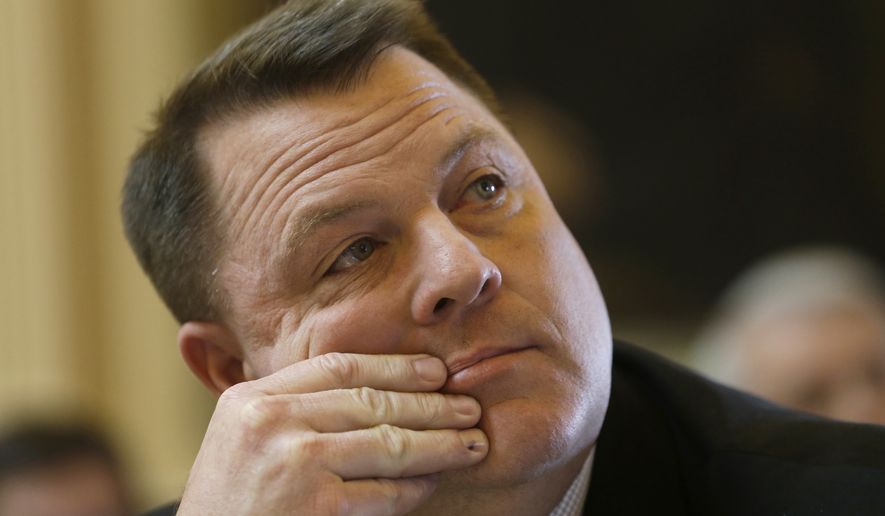Republican lawmakers in Maryland and Virginia are gearing up more fights over same-sex marriage in 2016, introducing bills ahead of both states’ legislative sessions to allow officials to refuse to sign marriage licenses for gay couples on the basis of religious beliefs.
After the Supreme Court’s decision in June establishing a constitutional right to same-sex marriage, social conservatives are hoping to carve out space for conscientious objectors whose beliefs clash with their duties as public officials or clergy who officiate marriages.
Virginia state Sen. Charles W. “Bill” Carrico Sr. said he heard a demand from voters in his district, which borders Kentucky, where Rowan County Clerk Kim Davis was jailed briefly this summer for refusing to sign marriage certificates for same-sex couples.
“There were a lot of concerns from my district constituents that they would imprison someone who is basically standing up for what they believe in, their right of conscience, and the fact that she didn’t believe in homosexual marriages and that she didn’t want to issue marriage licenses,” said Mr. Carrico, Bristol Republican.
He has written one bill to protect state officials from retribution and another to protect clergy who refuse to officiate ceremonies of same-sex couples.
Gays who want to marry could obtain marriage licenses from the state’s registrar of vital records, who would issue certificates without a signature.
In Maryland, Delegate Richard Metzgar’s proposed legislation would protect only religious groups from having to sign same-sex marriage licenses under the state’s Marriage Equality Act, but it wouldn’t shield government officials such as clerks.
“It comes down to something very simple,” said Mr. Metzgar, Baltimore County Republican. “If a person belongs to an organization that does not believe in the Marriage Equality Act, they can’t be sued. Simple as that.
“I’m not going after gay couples,” he said. “I’m just protecting the pastors.”
The lawmakers are testing the boundaries of the Supreme Court decision, which religious leaders fear could force churches that have moral objections to same-sex marriage to officiate them or else be held in violation of discrimination laws.
But gay rights advocates say the bills would create exemptions that would free officials to treat people differently.
“The problem with the bill is that it allows people acting as agents for the state arbitrarily [to] decide which rules they are going to follow in their job and which they are not going to follow,” said James Parrish, executive director of Equality Virginia.
He said the Virginia bills are too broad. Instead of targeting only same-sex marriage, they are written to shield clerks who object “to the issuance of such license on personal, ethical, moral or religious grounds.”
“Personal, ethical, moral or religious grounds — what are we talking about?” Mr. Parrish said. “Gay marriage, interracial marriage, couples with a large age disparity? This is a very broad bill that would give a license to discriminate.”
Virginia Gov. Terry McAuliffe, a Democrat, has promised a veto if either bill clears the legislature.
“Gov. McAuliffe believes legislation like this would send the wrong message to people around the globe about the climate Virginia offers businesses and families who may want to locate here,” said Ira Palmer, a spokesman for the governor. “He supports same-sex marriage and believes we need to be working to make Virginia more open and welcoming to everyone, not less.”
Maryland and Virginia already have legal provisions to shield religious officials from having to grant marriage-related services to same-sex couples, leading some gay rights advocates to complain that lawmakers are trying to grandstand on a nonissue.
“This is a waste of taxpayer time,” said Larry Stafford, executive director of Progressive Maryland. “File a real bill, something that will actually help your people. Don’t waste time in Annapolis on a bill that, 1.) won’t be passed at all and, 2.) doesn’t make sense.”
The office of Maryland Gov. Larry Hogan, a Republican, did not respond to requests for comment.
Other states also are grappling with same-sex marriages.
Lawmakers in Tennessee and South Carolina have filed bills dubbed the Natural Marriage Defense Act, which they believe would void the Supreme Court decision and allow their states to continue to define marriage as the union of a man and a woman.
Louisiana Gov. Bobby Jindal, a Republican, issued an executive order in May that would prevent the state from “discriminating against people, charities and family-owned businesses with deeply held religious beliefs that marriage is between one man and one woman.”
• Anjali Shastry can be reached at ashastry@washingtontimes.com.




Please read our comment policy before commenting.